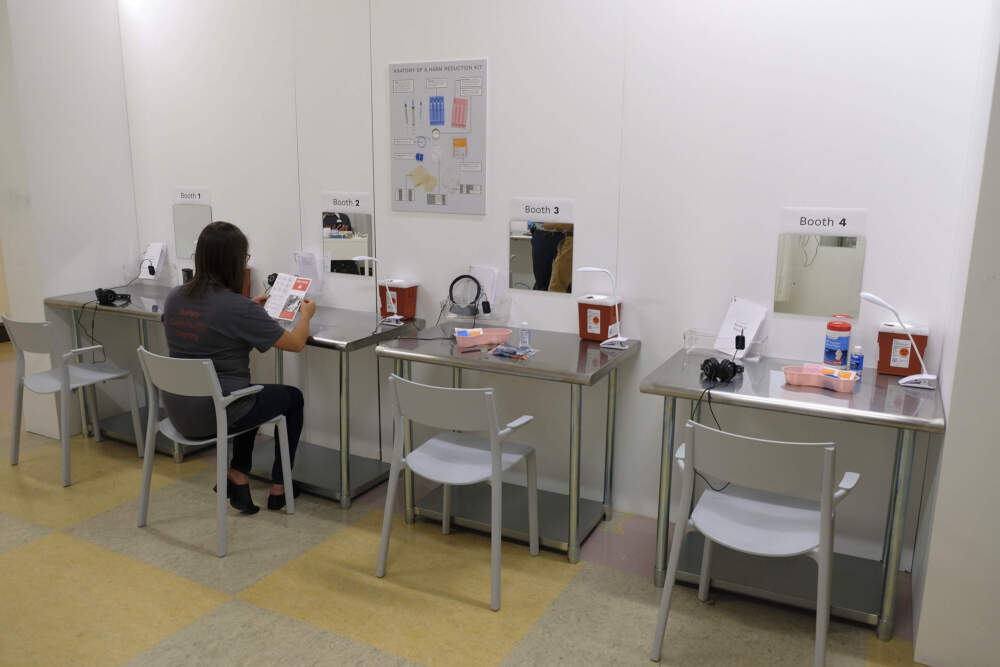Advertisement
Mass. Health Dept. says state needs controversial overdose prevention centers

The Massachusetts Department of Public Health is endorsing overdose prevention centers where staff are on hand, if needed, to revive clients who use drugs. The department published a report Wednesday on the feasibility of opening these sites, which have generated public controversy and may violate federal law.
The report was released in conjunction with the latest statewide overdose death numbers. They showed virtually no change in the record-setting high count of fatal overdoses Massachusetts posted six months ago.
“Overdose prevention centers would be an effective means of reducing overdoses and fatalities in the commonwealth,” said Public Health Commissioner Dr. Robbie Goldstein, based on data from sites in Canada, Australia and Europe as well as the only two U.S. facilities in New York City. “There has never been an overdose reported at a sanctioned center.”
But Goldstein acknowledged that state and federal laws prohibit much of what happens inside overdose prevention, or supervised consumption, sites. That includes possession and use of drugs by clients and supervision by staff. Clinicians could risk losing their professional medical licenses if they were investigated or charged. The organization that provides space for illegal drug use could also face charges.
The DPH report concludes it would not be feasible for a municipality to open a site without at least state-level liability protections. It recommends the Legislature pass one of several bills heard earlier this year that seek to address the issue. State House leaders have not committed to doing that.
In emails, a spokesperson for House Speaker Ron Mariano said the House has invested millions of dollars in preventing addiction and overdose deaths, and will review the report and significant barriers imposed by federal laws.Senate President Karen Spilka called the opioid epidemic “heartbreaking.” She said the Senate has a strong record of supporting harm reduction, adding she’ll review the report and discuss it with Senate colleagues.
Gov. Maura Healey’s office indicated she would be open to considering supervised consumption sites.
“This report shows that allowing communities to establish overdose prevention sites can be an effective and safe tool,” Healey’s spokesperson said. “She will review any legislation that reaches her desk.”
Overdose prevention center supporters are frustrated by pledges to discuss and review another report that supports this way to save lives during the drug overdose crisis. It’s been almost five years since a special commission recommended creating one or more pilot supervised consumption sites in Massachusetts. Legislation that would have turned that idea into law has stalled every year.
Advertisement
Cassie Hurd, director of the Material Aid and Advocacy Program, said having DPH acknowledge all the evidence that shows overdose prevention centers work is a positive step, “but only if it brings action, meaning the authorization of overdose prevention centers.”
Hurd’s organization assists people who don’t have stable housing in Boston and Cambridge. A neighboring community, Somerville, is the only municipality in Massachusetts that has pledged to open an overdose prevention center. But organizers have said it will be hard to recruit staff and run a facility unless the state removes some of the legal risks.
Goldstein said the Department of Public Health would assist any municipality that wants to open an overdose prevention center but has no plans for a state-run site. The DPH report doesn’t recommend a specific number of sites.
In a deviation from earlier recommendations, the DPH report does not call for lawmakers to vote for or against supervised consumption clinics. Instead, the report focuses on removing legal and licensing barriers to the sites. Some State House observers say that may be a more politically feasible approach.
“Consensus seems to be building that liability protections for providers are among the key actions the legislature may need to take to realize overdose prevention centers in Massachusetts,” said Senator Julian Cyr, a sponsor of one such bill.
Even if lawmakers take this step, organizations, staffers and clients could still be at risk for federal charges. The Acting U.S. Attorney for Massachusetts has not yet responded to questions about whether he would move to close overdose prevention centers. The top federal prosecutor in New York City has said he might enforce federal laws and shut down two sites there. They are operating under an agreement with the city but don’t have state or federal protections.
A recent poll found 70% of Massachusetts residents support legislation that would let cities and towns pursue overdose prevention centers, but respondents were not asked if they wanted a site in their neighborhood.
The Massachusetts Medical Society has lobbied for protections that would ease the fears of doctors and others who’d staff these centers. The group’s President, Dr. Barbara Spivak, said she’s certain there are clinicians ready to sign on. And Spivak says it’s time.
“We’ve done very little that is truly effective to reduce deaths and the effects on an entire family and community,” said Spivak. “Our goal should be to promote this in every community in the state.”
